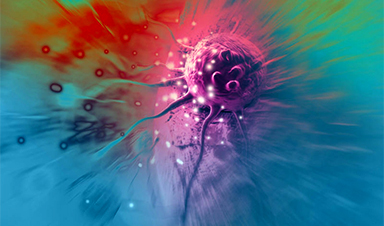Machine-learning algorithms tuned to detecting cancer DNA in the blood could pave the way for personalized cancer care.
copyright by www.the-scientist.com
Modern cancer medicine is hampered by two big challenges—detecting cancers when they are small and offering cancer patients personalized, dynamic cancer care. To find solutions, several academic labs and biotech firms are turning to artificial intelligence, working to develop machine-learning algorithms that could help decipher weak signals in the blood that can identify cancers at an early stage and indicate whether a cancer is responding to treatment in real time.
“You have to find this needle in a haystack . . . this very weak signal amongst all of the cacophony of everything else happening in the body,” says Dave Issadore , a bioengineer at Pennsylvania State University and founder of Chip Diagnostics, which is developing a machine-learning method to diagnose disease by sequencing extracellular vesicles’ cargo.
So far, machine-learning algorithms designed to detect minute quantities of tumor DNA in a blood sample—the goal of so-called liquid biopsies—have performed well in clinical validation studies, but no self-learning algorithm has yet been approved for clinical use. These have the potential to outperform imaging and tissue biopsies in detecting and monitoring cancers by looking for mutations in DNA, RNA, and proteins directly from the blood.
“I think the dream of liquid biopsy is to, A), detect cancer when there is very little of it, and, B) detect cancers during treatment,” says Dan Landau, a clinical oncologist and researcher at Weill Cornell Medical School in New York. However, in the both contexts, liquid biopsy techniques struggle to accurately detect cancer among the infinitesimally small quantities of tumor nucleic acids in the blood. Although the technique’s performance varies between cancer types, liquid biopsies so far have been able to detect cancer in around half of early-stage patients diagnosed through imaging, giving it a sensitivity of just 50 percent.
Image Credit: The Scientist
News This Week
Team finds flawed data in recent study relevant to coronavirus antiviral development
The COVID pandemic illustrated how urgently we need antiviral medications capable of treating coronavirus infections. To aid this effort, researchers quickly homed in on part of SARS-CoV-2's molecular structure known as the NiRAN domain—an [...]
Drug-Coated Neural Implants Reduce Immune Rejection
Summary: A new study shows that coating neural prosthetic implants with the anti-inflammatory drug dexamethasone helps reduce the body’s immune response and scar tissue formation. This strategy enhances the long-term performance and stability of electrodes [...]
Scientists discover cancer-fighting bacteria that ‘soak up’ forever chemicals in the body
A family of healthy bacteria may help 'soak up' toxic forever chemicals in the body, warding off their cancerous effects. Forever chemicals, also known as PFAS (per- and polyfluoroalkyl substances), are toxic chemicals that [...]
Johns Hopkins Researchers Uncover a New Way To Kill Cancer Cells
A new study reveals that blocking ribosomal RNA production rewires cancer cell behavior and could help treat genetically unstable tumors. Researchers at the Johns Hopkins Kimmel Cancer Center and the Department of Radiation Oncology and Molecular [...]
AI matches doctors in mapping lung tumors for radiation therapy
In radiation therapy, precision can save lives. Oncologists must carefully map the size and location of a tumor before delivering high-dose radiation to destroy cancer cells while sparing healthy tissue. But this process, called [...]
Scientists Finally “See” Key Protein That Controls Inflammation
Researchers used advanced microscopy to uncover important protein structures. For the first time, two important protein structures in the human body are being visualized, thanks in part to cutting-edge technology at the University of [...]
AI tool detects 9 types of dementia from a single brain scan
Mayo Clinic researchers have developed a new artificial intelligence (AI) tool that helps clinicians identify brain activity patterns linked to nine types of dementia, including Alzheimer's disease, using a single, widely available scan—a transformative [...]
Is plastic packaging putting more than just food on your plate?
New research reveals that common food packaging and utensils can shed microscopic plastics into our food, prompting urgent calls for stricter testing and updated regulations to protect public health. Beyond microplastics: The analysis intentionally [...]














Leave A Comment